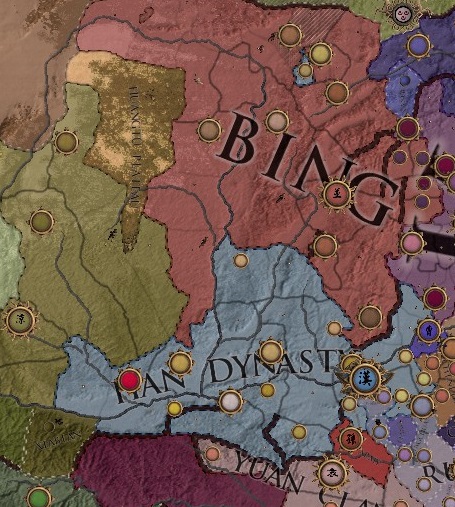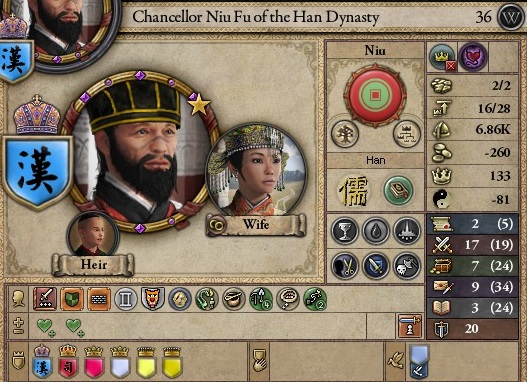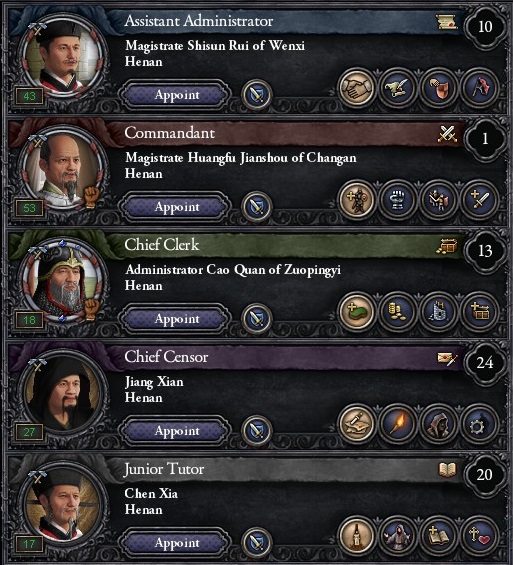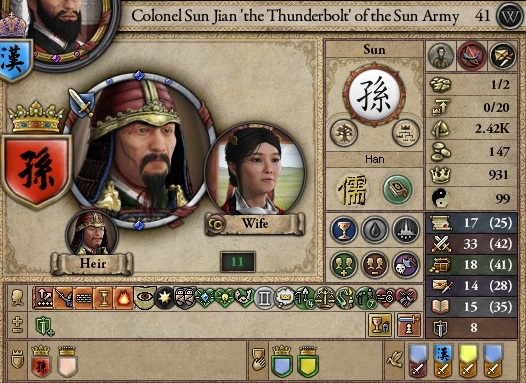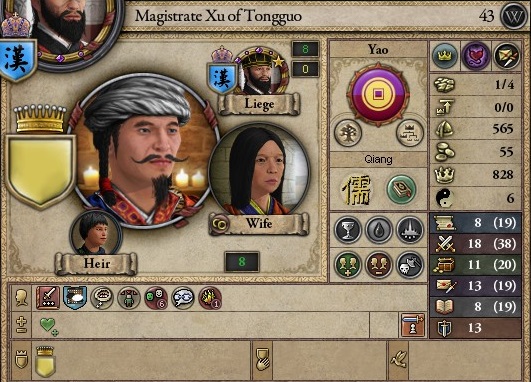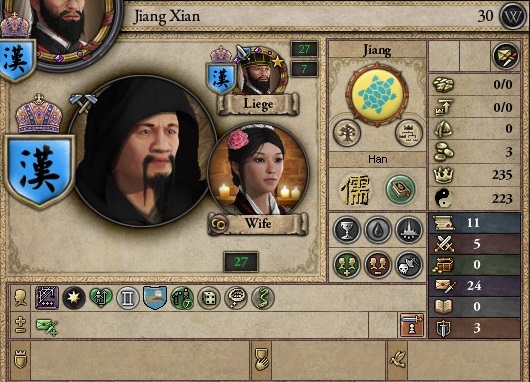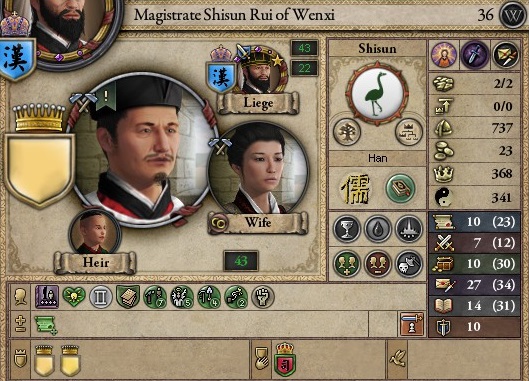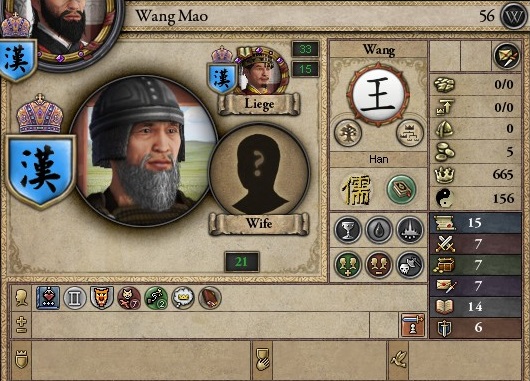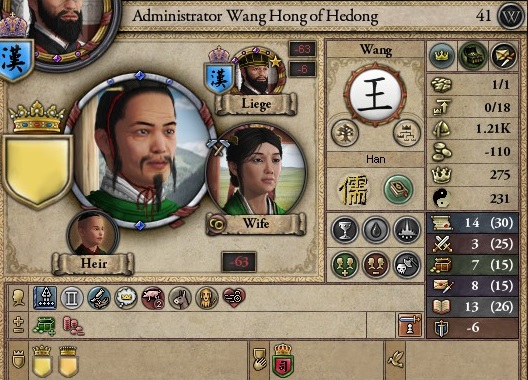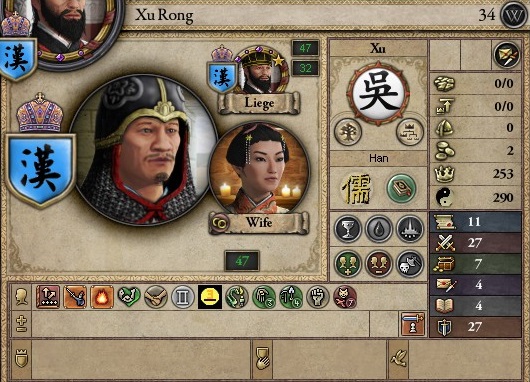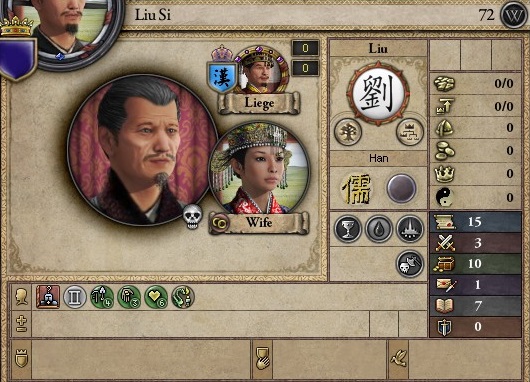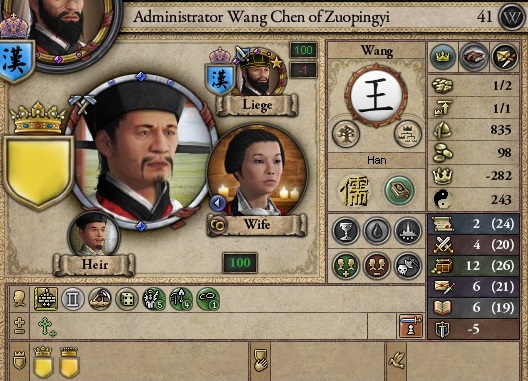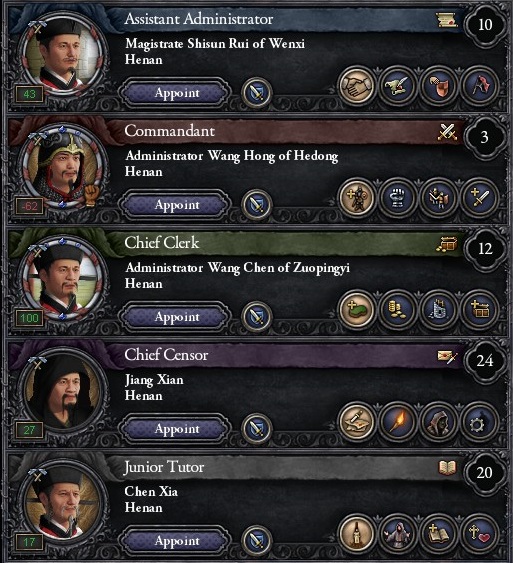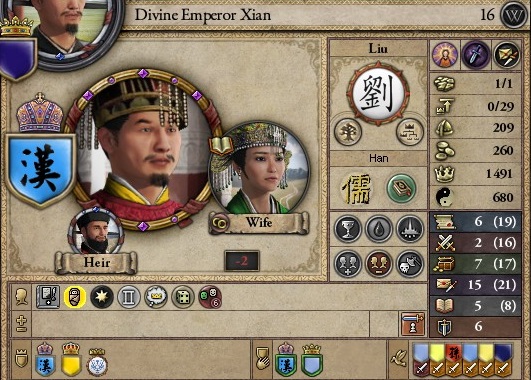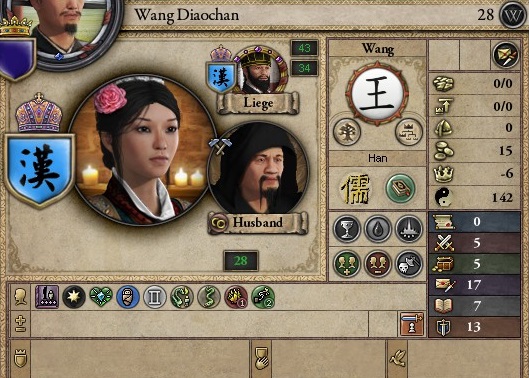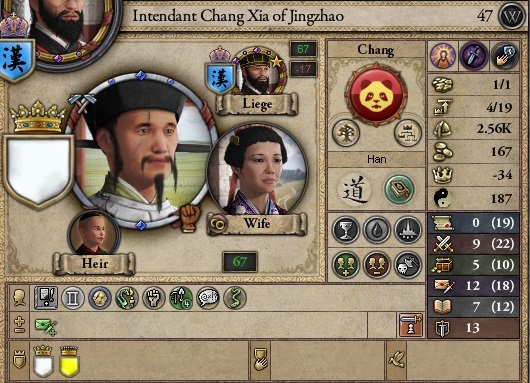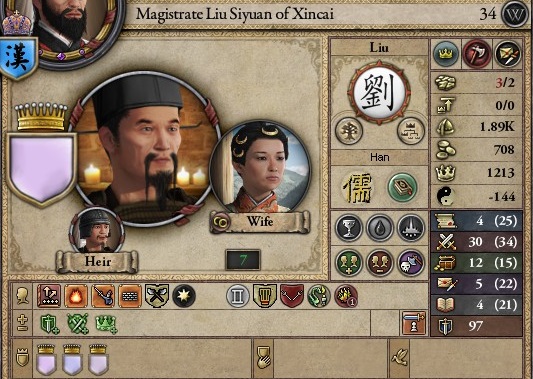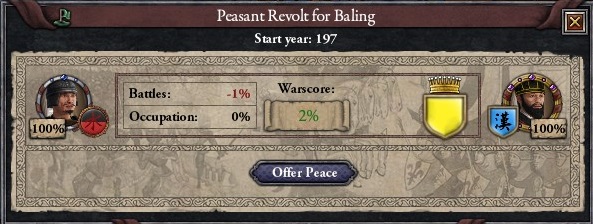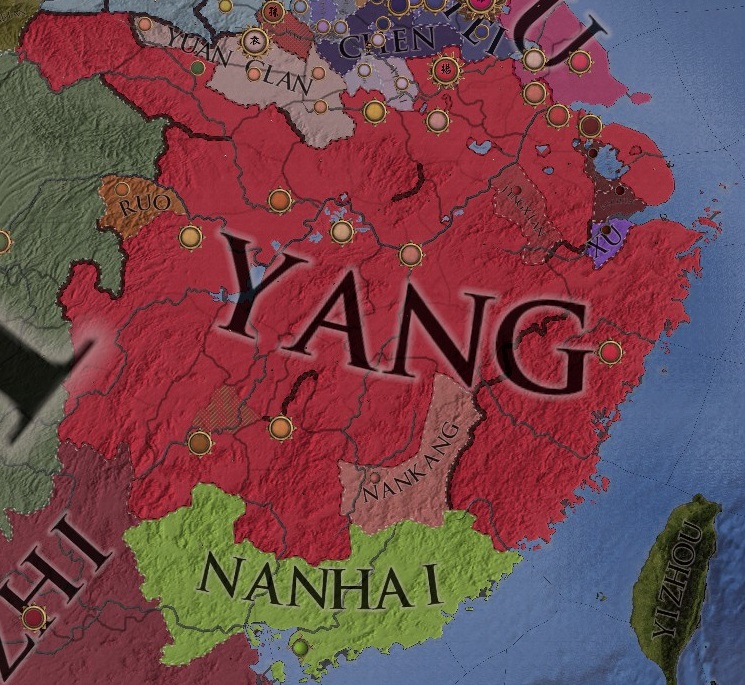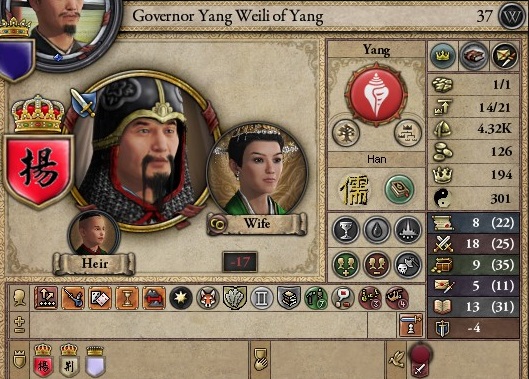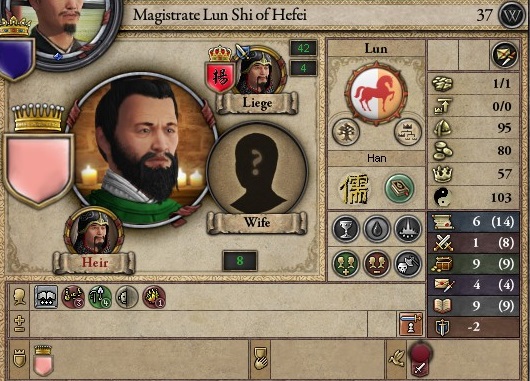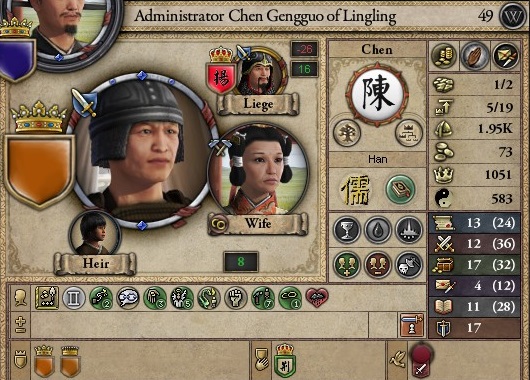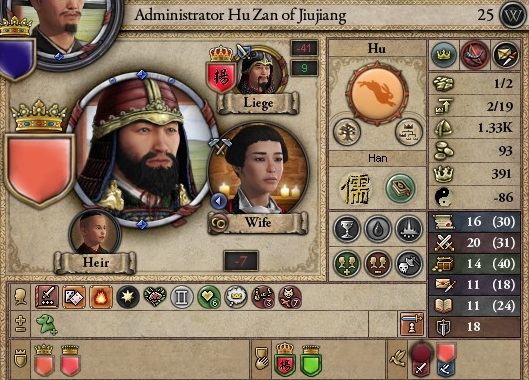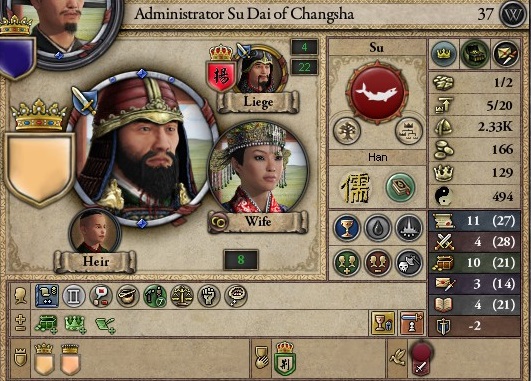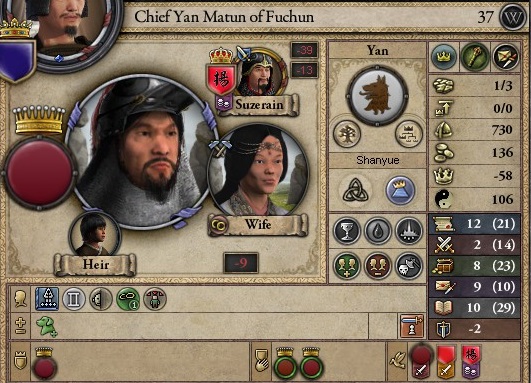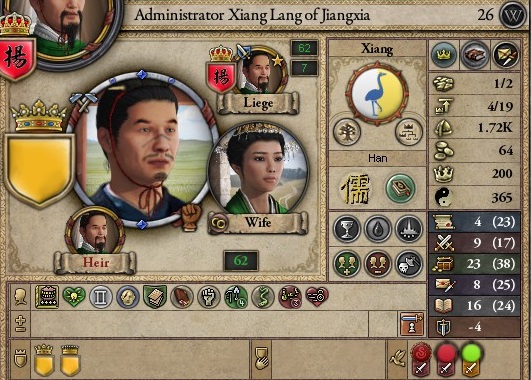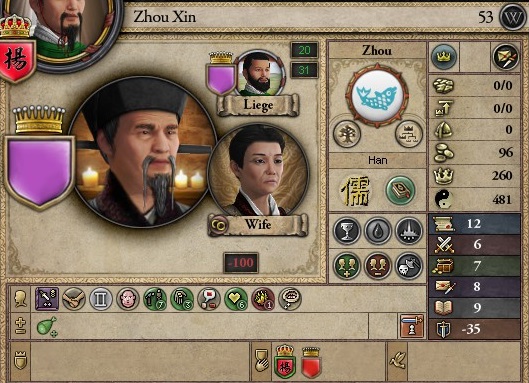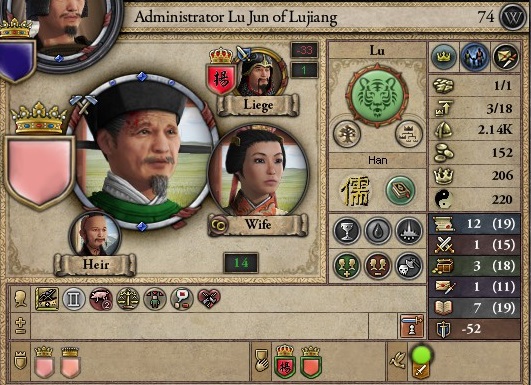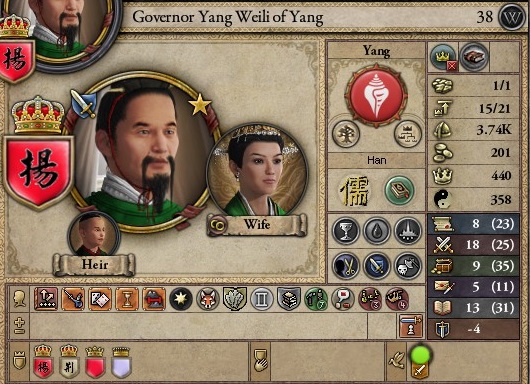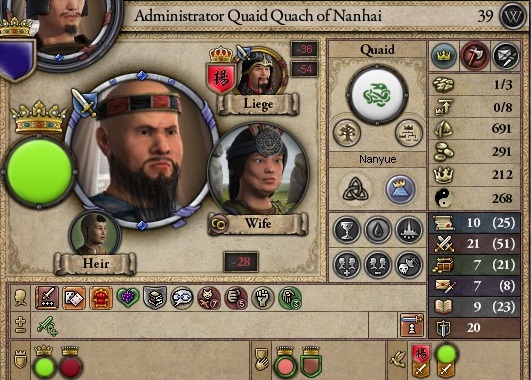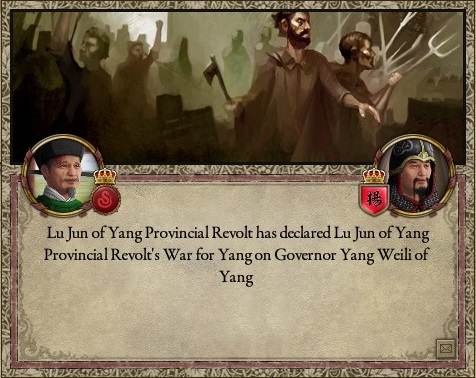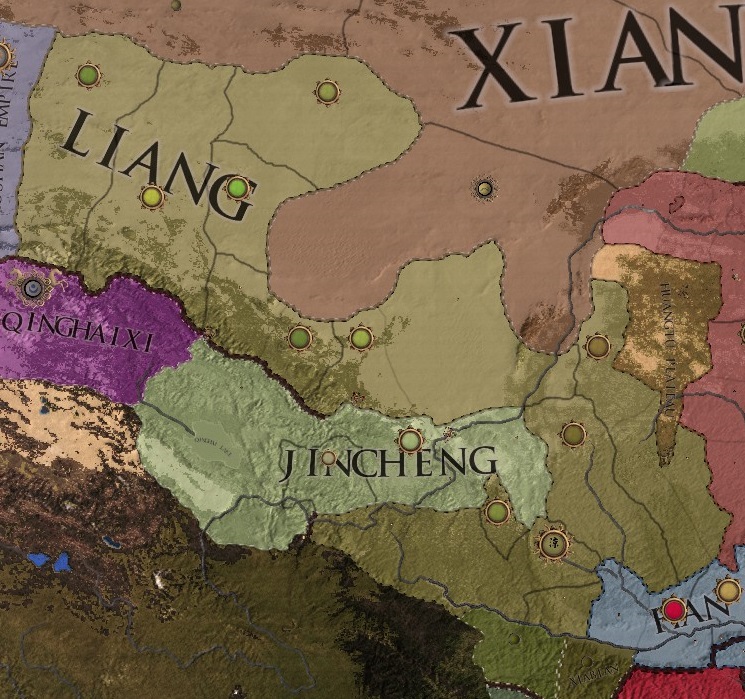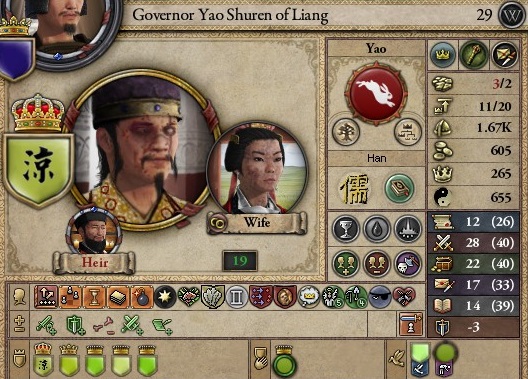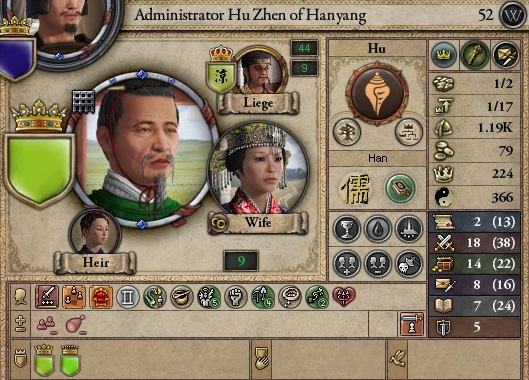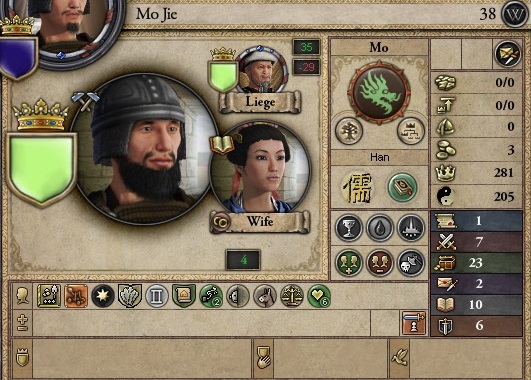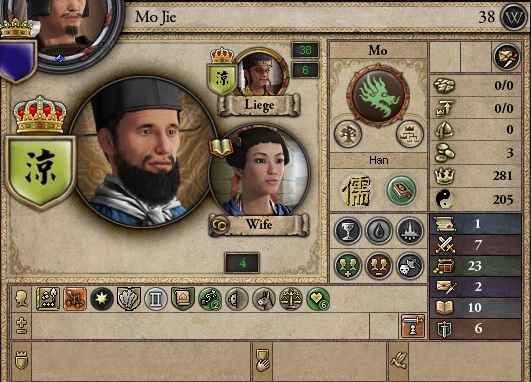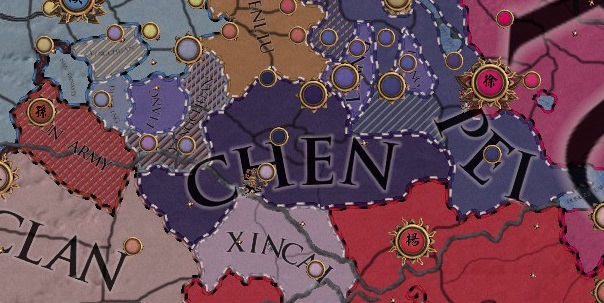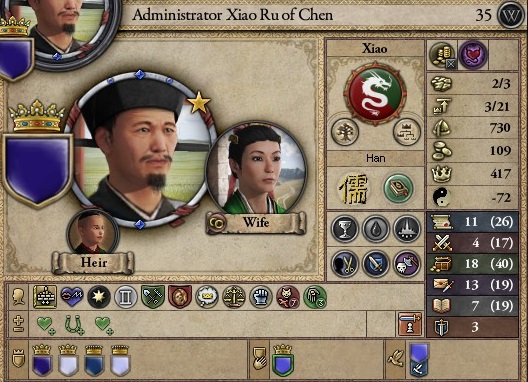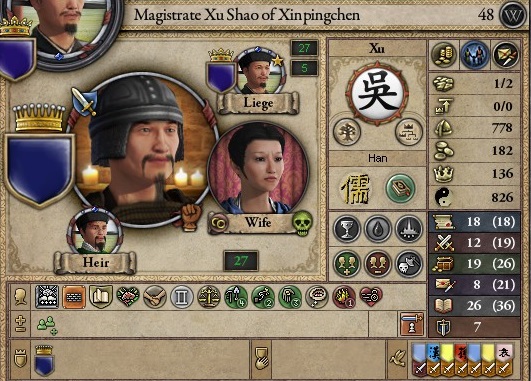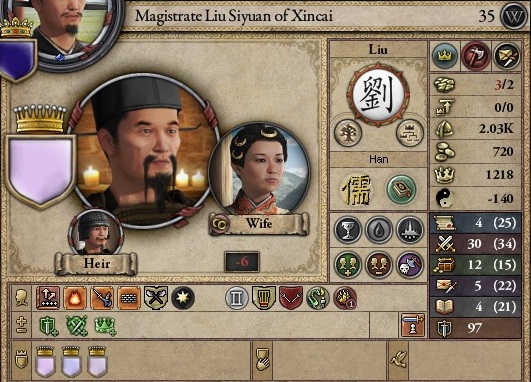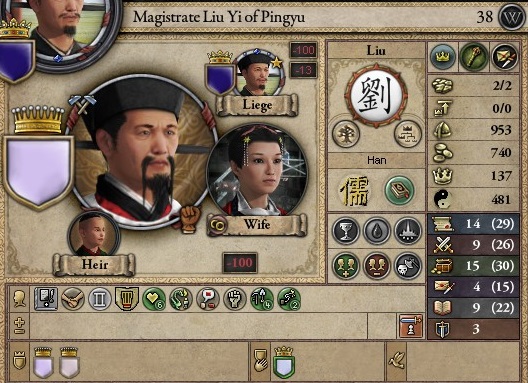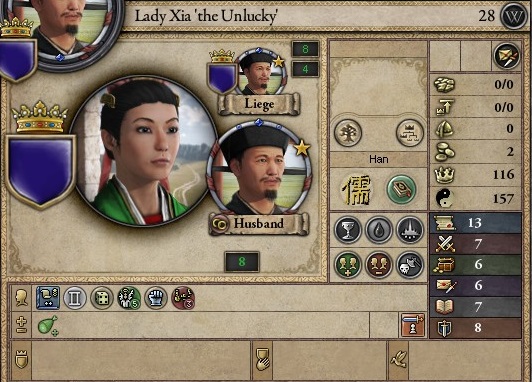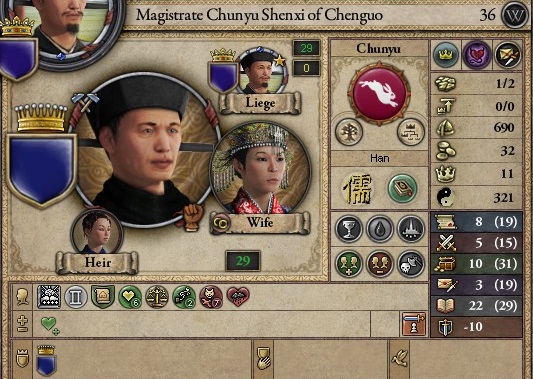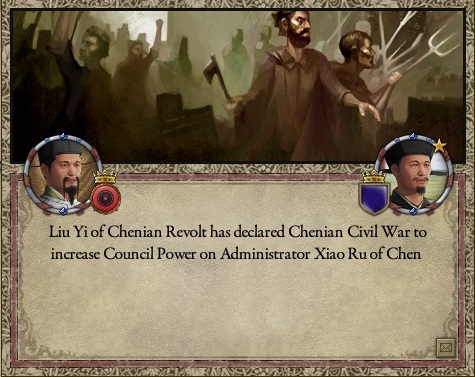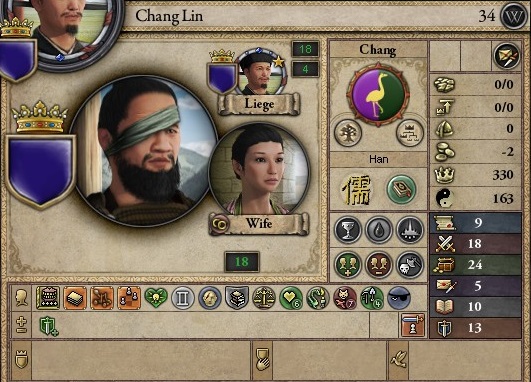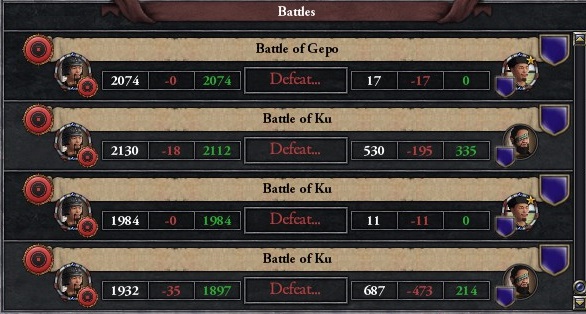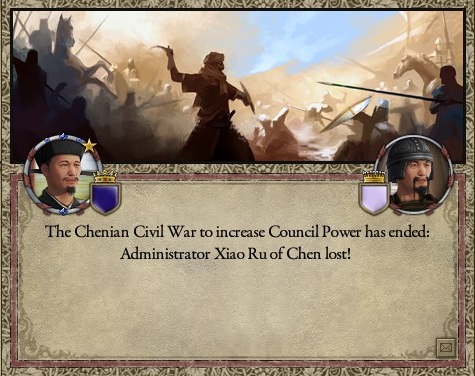197-198: A FUTURE FOR LIANG
Yao Shuren had finally found a way to get some recognition from the Imperial Court. Han Sui and his rebels had been a torn in their side for a decade now. So surely Niu Fu and his ilk would be all too happy to see them destroyed. And the Chancellor certainly took the bait. Whatever his opinion of Yao Shuren was, at least he paid lip service to the Capital, while the rebels were in outright opposition to the Emperor. Niu Fu gave his support to Yao Shuren’s attack on the rebels, even if the Wang Clan was highly opposed to this. This turned a personal campaign into a fully sanctioned one. Yao Shuren was all too happy with this news. It seemed that the lip service he had given to court was paying off, and now he had far more leeway in his authority. In March 197, Yao Shuren declared his first independent campaign, ready to enter the history books as the one who finally ended the Liang Rebellion. He left his trusted wife Guo Yuyi to handle his domain, as he trusted her more than any officials at his service, despite their recent disputes over succession. Convinced that Liang would be well managed in his absence, he took his generals and marched into the mountains.
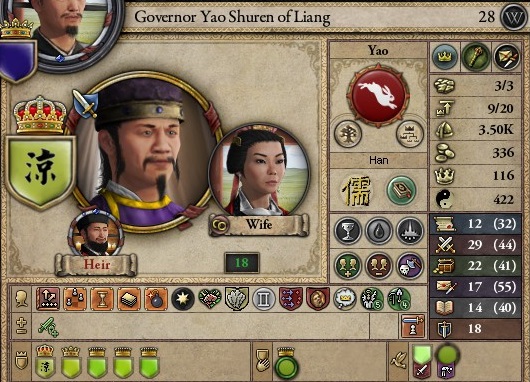
Han Sui only learned of this a month later, as he was still fighting the Qinghaixi Khaganate at the time. He and Ma Teng were forced to sign a quick peace with Cheliji Khagan, taking some territories and using them to raise a quick army to respond. They had little time to handle such matter though, as the threat of Yao Shuren’s fast moving army could be upon them at any time. So Ma Teng suggested that he stayed behind to raise new troops. He was technically a Qiang, just like the local population, even if he had been raised under the Han Dynasty. Han Sui agreed, trusting his old companion to handle the recruitment while he went to deal with the problem of the invasion. And who knew? With some luck, they might not even need these extra recruits to defeat Yao Shuren.
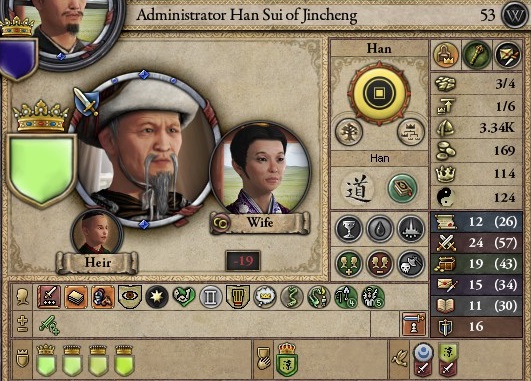
At that time, the Governor of Yang Province was advancing on the rebel territories, leading his army through the difficult mountains of the province. Even so, he advanced so fast that by the time of the treaty between Han Sui and Cheliji Khagan, he was already within reach of a city. Surprised by this quick pace, Chenggong Ying wished to leave the rebels’ home base to go oversee the defense himself, but
Mo Jie volunteered to go in his stead. He explained that Chenggong Ying was needed to manage the territories until Han Sui’s return. At least that’s what Chenggong Ying understood, as Mo Jie was actually meekly suggesting that as a siege expert and architect, he could probably defend the city from a siege. Mo Jie then wrote one last panicked letter to Han Sui to tell him to come back already before leaving. He was so determined to arrive fast that he only stopped to let the horse rest, eating and (more dangerously) sleeping on horseback.
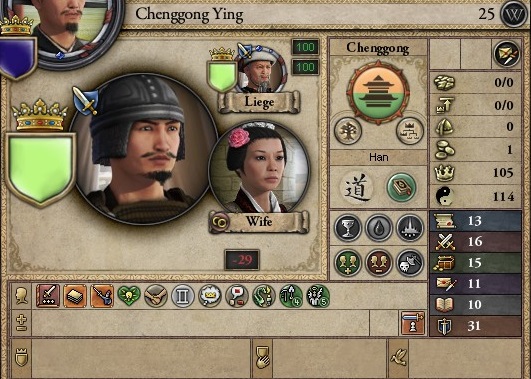
He arrived just in time, entering the city a few hours before Yao Shuren’s arrival. The timing was so close that the Governor’s scouts spotted him entering the city and reported his presence. Whoever this Mo Jie was (Yao Shuren had actually forgotten all about their previous encounter), Yao Shuren was confident he could force him to surrender. As it turned out, Mo Jie was surprisingly stubborn when it came to holding out, even if he lacked the troops to keep the provincial army out forever. As it turned out, even under a gruesome siege, Mo Jie proved to care for his men, often refusing to eat so they had more, and never even stepping a foot within the official mansion so to stay closer to the people. He certainly gained a lot of sympathy and support from the locals for his caring management of the siege. Within a week, he proved so liked that any hope of finding someone to cooperate with the besiegers turned to dust. But popularity didn’t win a siege, and by mid-May Mo Jie was forced to flee the city, although not before he sent Yao Shuren a demand that the citizen be allowed to evacuate freely (something Yao Shuren refused).
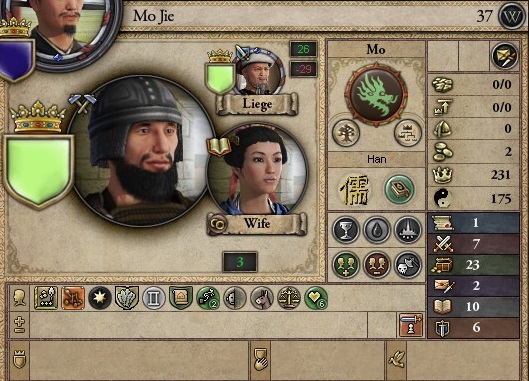
But Mo Jie had gained just enough time for Han Sui to return. He passed through his home base to grab Wang Bi and Ma Chao to assist him on this campaign before moving toward Yao Shuren’s position. For some reason, Yao Shuren had divided his troops, and with some of his army still assembling back home, he now found himself with less troops than the rebels. Adding to this was the advantage of the terrain, which was far more familiar to Han Sui and his followers, while the Governor of Liang Province had to use local barbarian guides to help his army through some of the more mountainous areas. When the troops fought outside of Linqiang, things seemed to be in Han Sui’s advantage. Never the less, Yao Shuren proved that he was no slouch when it came to strategy. Even with a numerical disadvantage of almost 1000 men and a bad position, he was able to fight back with ease. He actually inflicted just as much damages to the rebel forces as what he received. But even so, he realized that if things continued like that for a few days, this brutal fighting would leave him at a disadvantage. So after a gruesome day of fighting, he retreated back to the city he had just claimed.

Besides, Yao Shuren had a plan B in motion. The reason why he had detached some of his troops was so he could send them through another route directly to the rebel base. That detachment of seven hundred men was led personally by Hu Zhen, the older general who had been so loyal to Yao Shuren when he rose to power. This seemed like an excellent choice for a commander to lead this side expedition, except for one factor he had not been made aware of. It seemed like Hu Zhen had started to have violent episodes, where he was like a raged beast or spoke nonsense. Whatever insanity was starting to afflict him, he was still able to hide it most of the times. But when these urges came, it was proving to be quite problematic to his daily life. One such episode happened when the expedition actually spotted Han Sui’s returning army. While a clearer head would have wisely retreated, Hu Zhen suddenly started screaming weird sounds and charged like a madman. His men, taking this as an order to attack, followed suit. While Han Sui and the rebels were initially surprised, they quickly overran their attackers, inflicting a devastating defeat on Hu Zhen’s force and destroying his detachment entirely.
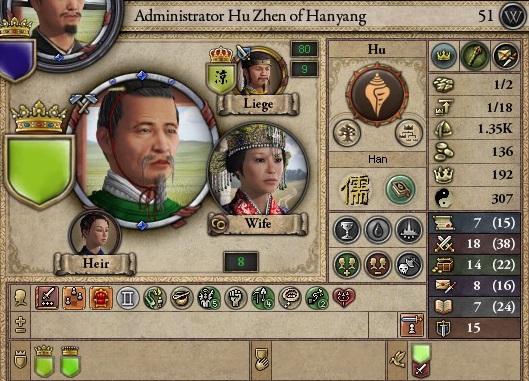
With these two successes, the rebels felt pretty good about themselves. In June, Han Sui returned to his seat of power and met with his followers, who were all too happy to celebrate the recent victories. The Imperial Government had sanctioned a campaign against them, and yet they were winning. This was good news. When news of Ma Teng’s recruitment going well reached them, Ma Chao even boasted that if things continued like this, the dream of freeing the whole province would be achieved before the turn of the century. While the other rebels weren’t as confident as he was, they certainly started to dream of a brighter future. Han Sui strategized that with the recent defeats of the provincial forces, there wouldn’t be a need to send as much troops this time. After a month of celebration and planning, he decided to send an expedition of two thousand men to go retake the conquered city while he waited for Ma Teng’s reinforcements. Ma Chao, Wang Bi and even Mo Jie all volunteered to lead the expedition. Only Ma Chao’s request was understood though, so the other two were left behind.
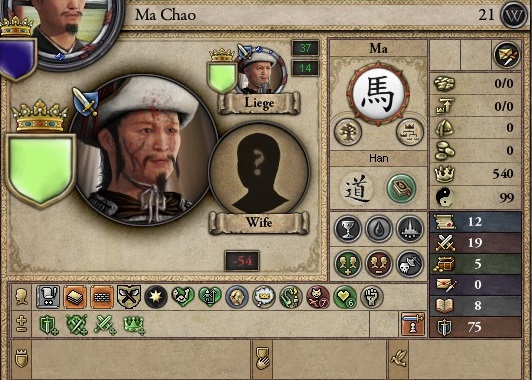
But the rebels had made a grave mistake. They thought Yao Shuren would have been pushed back, or would have replied to reorganize. Instead, the young warlord had simply continued to push forward. When he was defeated, he simply retreated to the lands he had conquered instead of his own. While the rebels were regrouping and preparing for a counter attack, he simply went on the move. When Ma Chao arrived in the occupied lands in August expecting to fight the provincial army, he soon discovered that they had already left. He was then doubly shocked when he received news from Han Sui that Yao Shuren was actually right at their doorstep with a rejuvenated army. With most of the troops stuck with Ma Chao, Han Sui had little to offer against Yao Shuren. But the morale of everyone was still high, with the rebel commanders like Wang Bi or Chenggong Ying charging head first against the enemy forces. Han Sui and his forced were pushed out, but they inflicted more damage to Yao Shuren than they received.

Han Sui and his allies were forced to evacuate their home base to regroup with Ma Chao and his forces. Mo Jie didn’t want to abandon the city, so he had to be forcefully removed by the men. While Han Sui admired his courage, the administrator was simply too important to their cause to be left behind. Sadly, they arrived to find that Ma Chao had made little advances when it came to retaking territories. It seemed that Yao Shuren had reinforced the garrisons before advancing. They thus had to decide if they were going to go back to attempt to relieve the siege or continue with the reconquest of territories. Of course, Ma Chao advocated to stay, as he didn’t want his work to go to waste. Most of the other officers advised Han Sui to retake their home base though, so the rebel leader finally decided in early October to march back to their home… only to learn on the way that it had already fallen.
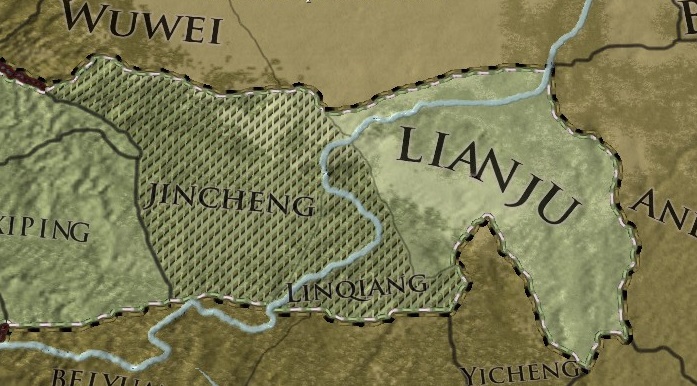
But Yao Shuren hadn’t stopped there. He continuously received reinforcements, his army now almost four thousand men strong. He had even hired Qiang barbarians as mercenaries, a dire blow to the morale of the rebels, who fancied themselves as their protectors. In fact, he felt so confident about the course of the current campaign that he invited his wife Guo Yuyi to come join him in the army camps. He missed her advices and her company, and the two would spend some lovely time together. Unbeknown to the couple, this “happy time” would result in another pregnancy, one that Yao Shuren firmly believed would result in a son this time. As they were enjoying their time late 197, they learned of Han Sui’s movements. Unable to return home or pierce the defenses he left behind, the rebels had decided to move to Lianju, an area they had conquered a few years back. Yao Shuren laughed at this. Yes, the barbarians would probably help them, but it also meant that they were surrounded now. Soon enough, victory would be his. He was sure of it.
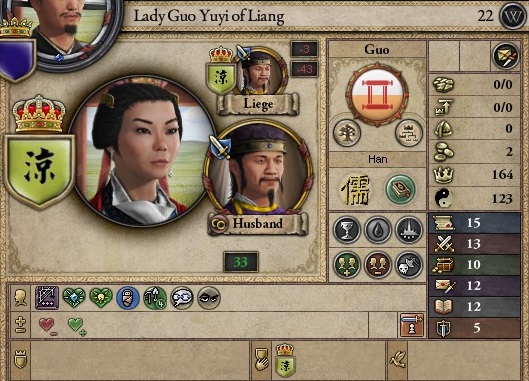
Heaven clearly had a thing against the Liang rebels. As if things weren’t already going badly for them, their holdout territories in the west were attacked in December by none other than Cheliji Khagan. It hadn’t even been a year since he had been forced to surrender territories to the rebels, but he had been planning to avenge this humiliating defeat ever since. Ma Teng had actually approached the Khagan, hoping he would now see the menace Yao Shuren represented. Cheliji Khagan rebuked him with a laugh. He didn’t care about Yao Shuren! In fact, news of his successes would finally convince him to attack those damn rebels who took some of his territories. The Khagan unleashed his horde on the border, violently assaulting the defenses throughout the end of 197 and the beginning of 198, slowly but surely occupying his former territories.
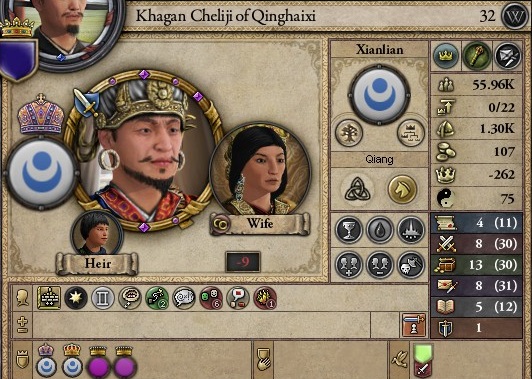
The successes of Yao Shuren and the advance of Cheliji Khagan weighted heavily on the mind of Qu Yan. The fall of the rebel home base convinced him that Han Sui’s cause was doomed. He never liked the old man, so he was not going to get dragged down with him. All that mattered to Qu Yan was that he retained control of his county. But he also wanted to protect the people under his care. While he didn’t want to admit it, the rebel cause had swayed him to be better and more generous, and he feared what would happen to the people should his territories be left to the mercy of the horde. So in February 198, he entered in a secret correspondence with Yao Shuren, offering him his loyalty and pledging himself to the Governor of Liang. Yao Shuren saw this as an opportunity and agreed. If anything, Qu Yan was a good commander, meaning that he was the perfect man to protect the border with the Qinghaixi Khaganate.
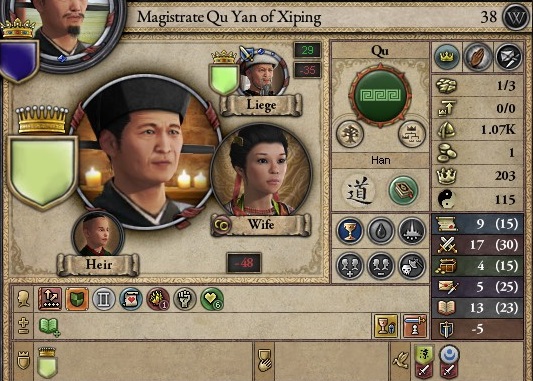
Ma Teng, who was residing with Qu Yan, soon became aware of the treacherous correspondence. As he feared, Yao Shuren was quick to send a letter to Qu Yan asking him to execute the rebel general. But Qu Yan, out of some weird sense of camaraderie, surprised Ma Teng by allowing him to flee and save his life. Ma Teng was thankful, and promised to repay this debt when they eventually won, which made Qu Yan laugh. Ma Teng thus rode away with some of his recruits to join Han Sui, trying his very best to get through Yao Shuren’s territories, he was often forced to fight his way through checkpoints and refused to abandon a single man behind, even if it meant risking his life. In the end, he managed to reach the other rebels, although he only had thirteen men remaining by his side. Everyone was happy to see him, as they were preparing an attack against Yao Shuren in the hope of retaking their former base.
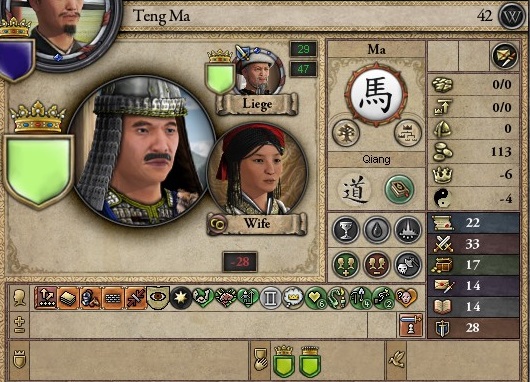
This desperate attempt at a rebel counterattack took place around the town of Yuanjie. The rebels were clearly outnumbered by Yao Shuren, who decided a simple defensive strategy would be enough to finally break them. But the rebels felt like this was their last chance, and they weren’t going to waste it. They fought with such determination that the provincial forces were taken by surprised. Weren’t these people supposed to be on the verge of surrendering? So why were they charging at them screaming? Panicked by this, the army of Yao Shuren quickly broke, although their leader managed to reorganize the vast majority of them in a coherent retreat. Those that didn’t were pursued by Wang Bi, which led to many of them falling of cliffs as they fled. Yao Shuren, who was leading from the frontline, even lost an eye in the fighting. But wanting to keep face, he would start telling a different tale of the loss of his eyes, claiming a dragon came to him, offering him a great destiny in exchange of his left eye. Whatever was the case, it was undeniable that he lost his eye during his retreat from the rebel force.

But that victory proved to be pyrrhic. This fast advance had stretched their supply line to its limit. Even if Mo Jie did an excellent job managing the supply, he lacked the manpower to protect it. Yao Shuren was quick to capitalize on this, launching a series of raids in early June that destroyed the line, causing many civilian victims in the process. Among the victims was the young son of Han Sui. The news of his death, adding to the realization that they once again had to retreat, broke the old leader. Chenggong Ying and Ma Teng tried to convince him to continue the fight, but he didn’t have it in him anymore. He was watching his dream of a free Liang die in front of his eyes, fourteen years of fighting for nothing, and this was proving too much. Refusing to live in a Liang Province dominated by Yao Shuren, Han Sui committed suicide in late June 198, just as the young governor was officially declaring victory over the rebels.
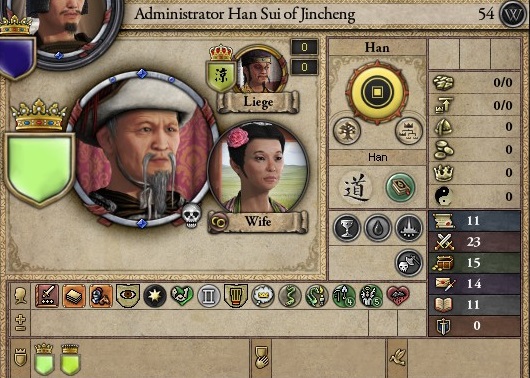
The death of Han Sui finally broke the rebel cause. Realizing that there was little chance of continuing the fight, the Ma Clan decided to leave the region altogether instead of risking falling in Yao Shuren’s hands. Wang Bi, who respected them greatly, chose to follow them in their exile, hoping to find a just cause to fight for elsewhere. They would all travel throughout China before eventually settling in the court of Governor Tao Shang of Xu Province, all the way east on the coast. Only two rebel leaders refused to join them. Chenggong Ying had never particularly liked Ma Teng assumption of leadership, and so refused to follow him anywhere. He instead decided to continue the fight on his own through guerrilla warfare in the mountains. His struggle would be short lived however, as he would die a few weeks later due to a smallpox epidemic that spread throughout the province (although fatefully his wife would survive him). Both Ma Teng and Chenggong Ying tried to convince Mo Jie to join them, but the architect refused. He was a son of Liang, and never would he abandon his home province. If this meant facing death, then so be it.
_______________________________
The victory had been far harder to achieve than he had ever anticipated. He thought these rebels had been at the end of their rope, yet they defeated him more time than otherwise, which Yao Shuren found rightfully annoying. He had been raised all these years by his father to be the best general possible, only to be repeatedly defeated by a bunch of disorganized rebels. Well, it didn’t really matter in the end. He had still won. Now all he needed to do was to make sure that history only recorded the
right version of this campaign.
“Is it here?” he asked the lieutenant accompanying him.
“Yes my lord!” the man answered.
“General Hu found a rebel leader hiding in this village.”
“And he made sure to send for me before making any decision.” Yao Shuren completed.
Once again, Hu Zhen made the right call. It was good to have such a loyal and understanding subordinate. The older man had been a lot of help back when Guo Si was still alive, and now he was proving ever the more reliable. And even better, he didn’t take important decisions without approval from his lord first. Yes, a perfect subordinate, Yao Shuren thought, at least if it wasn’t for those weird rumors about his mental state…
Once he had received news from Hu Zhen that he had found a rebel leader, he made haste with an escort, curious about the man they had found. He would have actually liked for his wife to accompany him, as her advices were always appreciated. He had grown quite fond of her, on an intellectual and maybe even personal level. She really knew what his goals were and was able to support him in achieving them. Sadly, she was feeling quite sick these days and was in no state to travel long distances that fast. Probably something related to her pregnancy. She had been sick at times during the previous ones, after all. And if getting deprived of her was the cost for her to safely give birth to a son, then it was a small one. Finally, he was going to have an heir, and their whole dispute over her bastard could be pushed aside.
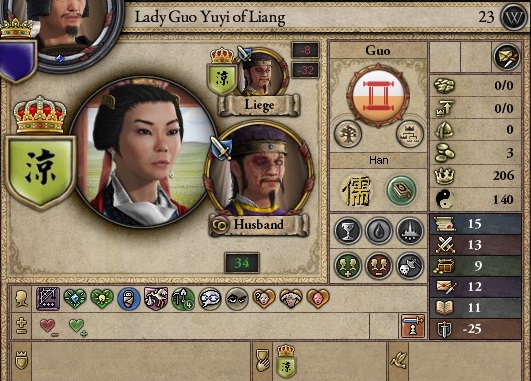
As he entered the village, he could see the local savages assembled outside of their homes. He had expected rustic homes for those Qiang barbarians to live in, but those were actually quite well built for the houses of savages. Surely it had been built by the rebels, who used their Chinese techniques to improve the Qiangs’ situation. The villagers had all been assembled in groups in the streets, watched over by his provincial forces. It seemed like Hu Zhen didn’t want them to try anything. Good. Yao Shuren would have been greatly disappointed if his right-hand man had been overpowered by barbarians trying to save the rebel officer. The soldiers were quick to salute their lord as he passed by on his horse, while his presence scared the locals. He was happy to see that the soldiers knew how to act in his presence. The last thing he needed was a bunch of unruly troops.
He was quickly greeted by a older man in armor, who quickly fell to his knees as Yao Shuren approached on horseback. He looked up at his lord, his slender but aging face clearly awaiting an order. Yao Shuren waved at him, telling him to get up. Still, the general waited, only getting up when his lord had dismounted. Hu Zhen was a bit taller than him, although he did not have the same presence as Yao Shuren.
“My lord.” Hu Zhen welcomed him with bow.
“You did well to call upon me, general.” Yao Shuren said.
“Now where is this rebel?”
“Inside this house, lord.” Hu Zhen explained, pointing at the building behind him.
“I placed soldiers to watch over him, just in case he tried anything.”
“We can never be too prudent.” Yao Shuren agreed.
“Was he hard to find?”
“Not really. He wore his finest clothes, so he stood out quite easily among the poor populace. He did not even try to flee when he caught to him, simply surrendering as if it was expected.”
“Did he?” Yao Shuren responded; his curiosity now piqued.
He quickly entered the house behind Hu Zhen, followed closely by his guards and his second-in-command. The home, while looking fine from the outside, was quite in bad shape inside. Either his men had ransacked it (a high possibility, he had to admit), or the people owning this house had done a terrible job of taking care of it. At the center of it was a man pushing forty, patiently waiting on his knees. Hu Zhen didn’t lie when he said that the man was easy to notice, wearing a right green dress that was more appropriate for the Imperial Court than the country side. No wonder he had been caught. He also had a dark bushy beard and calm eyes, as if he was resigned about his fate. Soldiers surrounded both him and a pregnant young woman by his side, which Yao Shuren guessed must be the man’s daughter, considering the age difference.
“You are in front of the Governor of Liang Province.” Hu Zhen told the man.
“Pay proper respect.”
The man’s eyes shifted to Hu Zhen for a moment before turning back to Yao Shuren.
“It is I, Mo Jie, is my name.” he said with a meek voice.
Wha-What was that? Was that supposed to be a proper introduction? Yao Shuren was a bit taken aback, both by the nonsensical words of the man and his weak voice. He expected him to be more boastful or challenging.
“Mo Jie… Where have I heard that name?” he asked out loud, as much to others than to himself.
“He was the man put in charge of the rebel defense of Linqiang, lord.”
Ah yes, that siege. The first obstacle they met during the campaign. This was supposed to be an easy affair, yet the man in charge of it refused to surrender and held for far too long. The rebels also had mentions of a man named Mo Jie in their papers, a great administrator or something. The more he looked at the man, the more he felt like he had seen him before, though… But that was irrelevant. What matter was that if that man was as good as he read, then it would be a waste to kill him here. Too bad he chose the wrong si…
“I serve Liang!” Mo Jie shouted.
Everyone looked at each other, unsure how to take this declaration. Yao Shuren had a pensive look on his face. There was certainly a lot of ways to interpret the sentence “I serve Liang”. Maybe he professed his support for the cause of the Liang rebels, even while facing imminent doom. Maybe he felt some stupid loyalty to the geographic notion of Liang, or maybe a sense of duty to its people. But there was also the possibility that he was offering his services to Liang Province, and thus to its governor. It wouldn’t be a first case of rebels asking to serve him, as Qu Yan had already demonstrated a few months ago.
“Do you now?” was his only response as he approached the rebel.
“I am a son of Liang and lived for it.” Mo Jie replied.
“I am ready.”
Again, this was ambiguous at best, incomprehensible at worst. Thankfully for Yao Shuren, this could also be left to interpretation, and he felt generous today. If Mo Jie could prove useful to his ambitions, then so be it.
“I’ll find use for you.” he said with a smile.
“My lord?” Hu Zhen asked, just as confused as Mo Jie.
“He’s coming back with us.” Yao Shuren declared as he turned around.
“But…” Mo Jie tried, before he was interrupted.
“I am Liang, and you will serve your people by serving me.” Yao Shuren interrupted before pointing at some of the soldiers.
“You, you and you. Escort Mo Jie and his daughter back to the provincial capital. Now.”
The men didn’t respond, simply grabbing the rebel and the teenage girl and carrying them outside the house.
“Find him a post, maybe as a small clerk to start with. I want to see the worth of the life I just saved.”
“Yes lord.” Hu Zhen answered, no longer questioning the decision.
“And general?”
“Yes lord?”
“Massacrer this whole village. If they were trying to hide a rebel, who know what they might try to hide from us in the future?”
“It will be done before sunset.” Hu Zhen promised.
____________
PS: Well, that’s it for the whole rebel storyline! Eight years of following that cast, and we had good times with them. But now, after what I think is my longest chapter so far, we reach the end of their story. Mo Jie is now part of Yao Shuren’s storyline, and while the Ma Clan will eventually reappear, they now serve Tao Shang, which is far closer to Yang Weili or Xiao Ru than Mo Jie.
PPS: I know we dunked a bit on Mo Jie for marrying a girl that is way younger to him, but I realized recently he’s not the only one with an icky marriage. Hu Zan’s (@patpekala ) second wife is actually… the stepmom of his first wife. So the second wife was married to her stepson’s grandfather. Kinda awkward. Never mentioned it cause it’s not really relevant to the plot, but still weird.